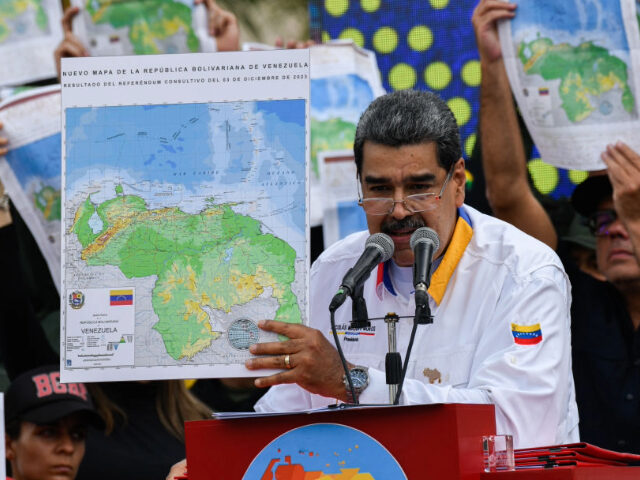CARACAS, Venezuela — The socialist Maduro regime announced on Monday that it has begun issuing Venezuelan government documents to the inhabitants of the contested Essequibo region, which makes up most of Guyana.
Venezuela has maintained a historic dispute with Guyana over the Essequibo region since at least 1899, but Maduro escalated the feud in December with plans to annex it.
Granting Venezuelan nationality and citizenship documents to the inhabitants of Essequibo was one of the five questions “asked” on the Maduro regime’s December 3 sham referendum. Venezuelan electoral authorities claim that more than 10.5 million votes were cast in approval of Maduro’s plans to annex the Essequibo region despite extensive media footage suggesting that, in reality, the electoral event was marked by extremely low voter turnout and barren electoral centers.
Socialist dictator Nicolás Maduro claimed that the results of the sham referendum were “binding” and ordered his officials to begin a list of actions to ultimately annex Essequibo, creating a new state in the territory and granting Venezuelan citizenship to the region’s roughly 125,000 inhabitants, most of whom belong to indigenous communities.
Maduro also announced plans to award oil, gas, and mining exploration licenses to companies seeking to operate in the contested territory, which is currently part of Guyana. The International Court of Justice (ICJ) has stated that it has jurisdiction over the dispute and is expected to rule on which country owns the Essequibo in the future.
The regime’s Interior, Justice, and Peace Minister Remigio Ceballos announced at a Monday press conference that SAIME, Venezuela’s identity and civil registry authority, has opened three mobile offices to provide Venezuelan nationality documents to inhabitants of the Essequibo who wish to obtain them.
The mobile offices, Ceballos explained, are operating in the Venezuelan city of Tumeremo, Bolívar state, where the Maduro regime opened a “temporary administrative” office for a hypothetical new state called “Guayana Esequiba.” Ceballos remarked that “permanent” SAIME offices will be eventually built in Tumeremo.
“We have to celebrate all the actions taken by our commander, President Nicolás Maduro, together with the Venezuelan people in the struggle and recovery of the Essequibo,” Ceballos said. “We are not mistaken; it is a great achievement and an advance for the country, each one of the strategies implemented by the Bolivarian Government.”
#11DIC || Como parte de las estrategias en la recuperación del Esequibo, el Almirante en Jefe aseveró que se encuentran activando oficinas del @VenezuelaSaime en Tumeremo. #NavidadEnSoberania pic.twitter.com/iNjDWOVwPi
— MPPRIJP (@MijpVzla) December 11, 2023
Rosalba Gil, head of Venezuela’s National Electoral Center (CNE), announced on Monday that she carried out an “institutional visit of recognition” to Tumeremo, where the CNE plans to open “new units” to register more citizens.
“We make a call to all the Essequibians that we are at their service in the civil registry to attend any situation, to fix their documents, and then give them their identification such as the identity card,” Gil said.
The Maduro regime has not offered any information on the number of Essequibo inhabitants who have received Venezuelan nationality documents at press time.
Venezuela and Guyana maintain an over 120-year territorial dispute over the Essequibo, an area of more than 61,600 square miles currently administered by Guyana and which represents two-thirds of Guyana’s entire territory.
The territorial dispute remained largely dormant in recent memory until Guyana’s discovery of offshore oil and subsequent deals with Houston-based ExxonMobil for its extraction drew the ire of Maduro, who accuses ExxonMobile of being part of a conspiracy by the United States to colonize South America.
Following a request made by Guyana in 2018, the ICJ ruled in 2023 that it has jurisdiction over the Essequibo territorial dispute. A ruling, however, is reportedly years away. The Maduro regime has insisted that it does not recognize the ICJ’s jurisdiction over the matter.
Maduro is slated to meet with Guyanese President Irfaan Ali on Thursday in Trinidad and Tobago to discuss the matter. Ali told France’s AFP news agency on Saturday that he will meet with Maduro, keeping his “firm” position on the territorial dispute between both countries.
“I am adamant that the dispute is before the International Court of Justice, and it is not for negotiations, and that will not change,” Ali told AFP. “Guyana is fully committed to the ICJ process and the outcome of the court.”
Venezuelan General Alexis Rodríguez Cabello, whom Maduro designated as the Essequibo region’s “sole authority,” claimed on Monday that he held a meeting with representatives of Essequibo’s indigenous communities to continue “strengthening the action plan” and “resolving the most specific needs of the inhabitants of the Essequibo”:
According to the guidelines on the region, President Nicolás Maduro has envisioned a development plan that addresses the issues of health, infrastructure, education and culture of the entire population, so this plan will be carried out in accompaniment of all the popular and indigenous living forces.
Although Maduro is moving ahead with his plans to annex Essequibo, Rodríguez Cabello assured that the socialist regime’s “harmonic development plan” for the contested territory “reaffirms everything” established by the regime’s so-called Bolivarian diplomacy of peace, where “through dialogue and social policies as the only tool, the only priority is the integral growth of the human being.”
Christian K. Caruzo is a Venezuelan writer and documents life under socialism. You can follow him on Twitter here.

COMMENTS
Please let us know if you're having issues with commenting.